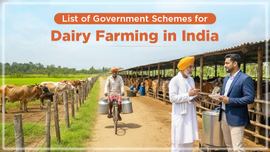Kisan Credit Card: A Lifeline for Farmers in India

Table of Contents
- Introduction
- What is Kisan Credit Card Scheme
- Objectives of Kisan Credit Card Scheme
- Credit Limit Under Kisan Credit Card Scheme
- Salient Features of Kisan Credit Card Scheme
- Security Requirement Under Kisan Credit Card Scheme
- Eligible Borrowers Under Kisan Credit Card Scheme
- Required Documents for Kisan Credit Card
- How to Apply for Kisan Credit Card Online
- Recent Initiatives to Expand the KCC Scope
Introduction
Availability of timely credit is critical for Indian agriculture to achieve desired growth so that it benefits more than 50% population deriving their livelihood from agriculture. Time and again successive governments in India have formulated various financial support schemes and one such is Kisan Credit Card (KCC) Scheme, which provides institutional credit at concessional rates to farmers for their credit requirements.
The introduction of Kisan Credit Card Scheme in 1998 to meet the short-term credit requirements of farmers have proven to be a lifeline for farmers in India. The scheme has streamlined the accessibility of agricultural credit and reduced the dependence on non-institutional credit in agriculture sector.
As of January 31, 2024, banks have issued 7.50 crores KCC with a limit of INR 9.4 lakh crores.
What is Kisan Credit Card Scheme?
Kisan Credit Card (KCC) Scheme envisages issuing KCC to farmers to readily buy agriculture inputs such as fertilisers, seeds, etc and draw cash for their production needs. The KCC are issued on the basis of land holdings.
The scheme has undergone various revisions from time to time. In 2004, it was extended to meet the investment credit needs of farmers for non-farm activities. In 2012, Electronic KCC came into existence.
Recently, the government extended the benefits of interest subvention under KCC to animal husbandry and fisheries sector.
What are the Objectives of Kisan Credit Card Scheme?
The KCC scheme aims to provide timely and adequate working capital to farmers to meet their short-and long-term credit requirements in a very simplified manner through a single window. The following credit needs of farmers are covered under the scheme:
Short-term credit needs
- Crop cultivation.
- Consumption needs of farmers.
- Produce marketing loans.
- Expenses for post-harvesting activities.
- Working capital for maintenance of farming assets and allied activities.
Long-term credit needs (Term Loan)
- Purchase of farm equipment like tractors.
- Investment in activities allied to agriculture.
- Investment made towards minor irrigation & land development.
What is the Credit Limit Under Kisan Credit Card Scheme?
The maximum permissible limit or total credit limit under KCC is the sum of short-term credit limit arrived for the 5th year and estimated long-term credit requirement.
The overall limit under KCC is INR 3 lakh per annum and subject to a maximum limit of INR 2 lakhs per farmer engaged in animal husbandry activities and/ or fisheries activities.
A flexible limit of INR 10,000 to INR 50,000 may be provided (as Flexi KCC) to the marginal farmers.
What are the Salient Features of Kisan Credit Card Scheme?
- Interest Subvention: For short-term crop loans up to INR 3 lakhs, an interest subvention of 1.50% (in case of non-prompt repayment) and of 3.00% (in case of prompt repayment) on 7% simple interest per annum is provided.
- Validity: The validity of the KCC is 5 years but subject to the periodic review by the banks.
- Repayment Period: The repayment period for crop loan is as per the anticipated harvesting and marketing period, for term loan it is based on the type of investment, and for fisheries and animal husbandry, it is fixed as per the cash flow/income generation pattern of the activity undertaken.
- Drawing Limit: The scheme fixes the drawing limit on cash credit for short-term needs on the basis of cropping pattern, whereas farmers can withdraw as per their convenience in case of loan amounts for maintenance of farm assets, crop production and consumption.
- There is no restriction in the number of debits and credits under the scheme and the short-term component under the KCC is a revolving cash credit facility.
- Collateral Free Loan: Under the scheme farmers can avail collateral free loan up to INR 1 lakhs and the premium under the scheme is shared between the bank and borrower in 2:1 ratio.
- Accidental Insurance: Beneficiaries with KCC covered with a personal accidental insurance of up to INR 50,000 (permanent disability and death) and up to INR 25,000 (other risks).
- Electronic Kisan Cards: All new KCC to farmers will be issued as smart card cum debit card. Further, they will be issued smart card cum debit card at the time of renewal of existing KCC.
- Implementing Agency: Commercial Banks, RRBs, Small Finance Banks and Cooperatives.
- Other Features: ATM enabled RuPay Card, one-time documentation, and built-in cost escalation in the limit.
What are the Security Requirements Under the Kisan Credit Card Scheme?
Hypothecation of crops as security required for limits up to INR 1.60 lakh and limits up to INR 3 lakh (in case of tie up).
Mortgage of land/ or third-party guarantee in addition to hypothecated crops / assets required for limits above the specified norms.
Who All Are Eligible Borrowers Under Kisan Credit Card Scheme?
- Farmers – Individual or Joint borrowers who are owner cultivators.
- Tenant farmers, oral lessees and share croppers.
- Joint Liability Groups (JLGs) or Self-Help Groups (SHGs) of farmers including share croppers, tenant farmers, etc.
What are the Required Documents for Kisan Credit Card?
- Duly filled and signed application form along with passport size photograph.
- Aadhaar Card copy and PAN Card/ Form 60
- Photo identity, address and signature proof
- Land details like Khasra & Satbara extract and land valuation report
- Declaration on availment of Crop insurance and Personal accident insurance scheme (PAIS)
- Tie up Agreement in case of tie up arrangements.
- Security or other documents (Wherever applicable)
How to Apply for Kisan Credit Card Online?
- Visit the website of the bank where you wish to apply for the KCC.
- Choose the Kisan Credit Card tab from the list of options available.
- Click on apply online button to open the application form in a new page.
- Fill the application form and click the submit button.
- On submitting the form, you will receive a tracker ID to track your application form. If you meet the eligibility criteria, bank will get back to you in 3-4 days.
What are the Recent Initiatives to Expand the KCC Scope?
The government in 2018-19 extended the KCC scheme to cover animal husbandry and fishery sector.
Since February 2020, the government has extended the scheme to cover all PM-KISAN beneficiaries.
To revolutionize the digital agri lending, the NABARD will integrate its e-KCC loan origination system portal with the Public Tech Platform for Frictionless Credit (PTPFC) of Reserve Bank Innovation Hub (RBIH).


Related Blogs












